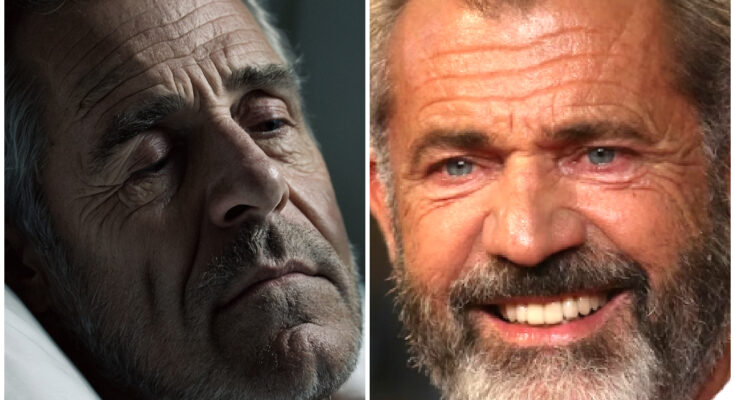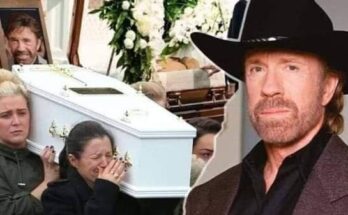LOS ANGELES — The world of entertainment is in shock today as news breaks that Mel Gibson, one of Hollywood’s most iconic and polarizing figures, has passed away at the age of 68. The actor, director, and producer, who became a household name through his powerful performances and controversial personal life, died unexpectedly earlier this morning at his home in Malibu. The cause of death has not been officially confirmed, though sources close to the actor suggest that it was due to a sudden health complication.
Gibson’s death marks the end of a storied and tumultuous career that spanned more than four decades. Best known for his roles in blockbuster films such as Lethal Weapon, Braveheart, The Passion of the Christ, and Mad Max, Gibson’s impact on Hollywood is undeniable, though his life was often marked by personal struggles and public controversy.
A Star is Born
Mel Columcille Gerard Gibson was born on January 3, 1956, in Peekskill, New York, the sixth of eleven children in an Irish-American family. His rise to fame began in the late 1970s with his role in the Mad Max series, which catapulted him into the international spotlight. His portrayal of the stoic and vengeful Max Rockatansky made him a star, but it was his role as the wisecracking cop Martin Riggs in Lethal Weapon (1987) that solidified his status as one of Hollywood’s top leading men.
By the 1990s, Gibson had become a global superstar, known for both his on-screen charisma and his off-screen intensity. His portrayal of William Wallace in Braveheart (1995), which he also directed, earned him two Academy Awards — one for Best Director and one for Best Picture. The film’s success cemented Gibson’s place among Hollywood’s elite, and it was during this period that he became as well known for his controversial remarks and behaviors as for his talent.
Triumphs and Tribulations
Gibson’s career was not without its scandals. In the early 2000s, he found himself embroiled in several public controversies, including anti-Semitic remarks made during a 2006 DUI arrest and other inflammatory comments that led to a significant public backlash. These incidents, combined with struggles in his personal life, including a high-profile divorce and allegations of abuse, resulted in a significant fall from grace for the actor-director.
However, Gibson made a remarkable comeback in the 2010s with the release of Hacksaw Ridge (2016), a World War II drama that garnered critical acclaim. His return to directing was marked by praise for his work on the film, which earned six Academy Award nominations, including Best Director for Gibson. Hacksaw Ridge not only demonstrated his enduring talent behind the camera but also showed that Hollywood was willing to forgive and embrace his artistic vision once more.
Despite his complex legacy, Gibson remained a beloved figure for many who appreciated his unapologetic creativity, his powerful performances, and his often unfiltered personality.
A Life Remembered
In the wake of his passing, tributes are pouring in from fans, colleagues, and industry leaders who remember Gibson both for his cinematic achievements and for his imperfections as a person.
Actor and longtime friend Danny Glover, who starred alongside Gibson in the Lethal Weapon franchise, expressed his grief in a statement: “Mel was one of the most talented actors I’ve ever had the privilege to work with. We had a deep bond that went beyond the screen. I’ll always cherish the time we spent together, both professionally and personally. My heart goes out to his family during this difficult time.”
Director James Cameron, who worked with Gibson on True Lies (1994), remembered the actor as a “force of nature” on set. “Mel’s passion for his craft was unmatched. He was an extraordinary filmmaker and an unforgettable presence in cinema. His work will continue to inspire filmmakers for generations to come.”
Gibson’s estranged relationship with the public, shaped by his past controversies, had softened in recent years, especially after his work on Hacksaw Ridge and other smaller, independent projects. His passing brings to the forefront a more nuanced reflection of the man behind the movies—a complex figure who wrestled with both personal demons and public perceptions, yet continued to create powerful art.
The Legacy of Mel Gibson
As Hollywood grapples with the loss of one of its most polarizing figures, it is clear that Mel Gibson’s legacy will remain etched in the history of cinema. From the high-flying action of Lethal Weapon to the emotional depth of Braveheart, and the spiritual reverence of The Passion of the Christ, his work spans genres and generations.
Though his personal life was filled with turmoil, there is no doubt that Gibson’s impact on the world of film is indelible. His unflinching willingness to take risks, both as an actor and a director, made him a revolutionary force in Hollywood.
In his later years, Gibson had begun to focus more on directing and producing, with several projects in the pipeline at the time of his death. It is clear that even in his final years, Gibson was not finished telling stories.
As tributes continue to pour in, fans and colleagues alike are left to reflect on the work of a man who, for better or worse, changed the face of modern cinema.
Mel Gibson may no longer be with us, but his films, his performances, and his undeniable influence will continue to resonate for generations.
Rest in peace, Mel Gibson. Hollywood, and the world, will never forget you.


